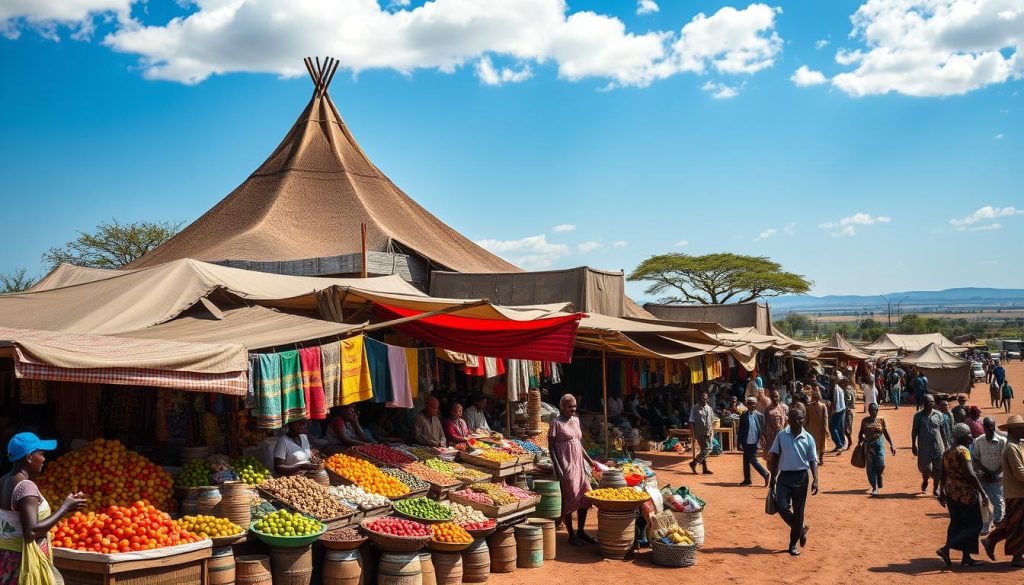Africa is quickly becoming a key player in global trade. It offers many chances for UK businesses to grow. The continent has lots of natural resources, a young population, and growing markets.
Recent data shows a big increase in trade across Africa. This shows the continent is becoming more connected to the world. By learning about the African market and its potential, UK businesses can find success.
This article will look at the chances and challenges in African trade. It aims to give businesses the knowledge they need to succeed.
Understanding the African Market Landscape
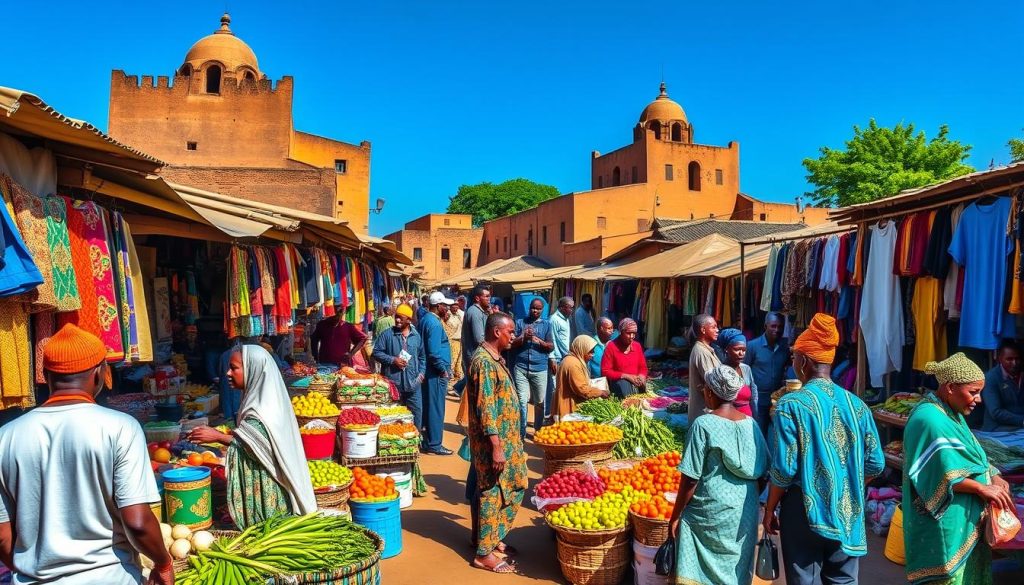
The African market is a mix of different economic conditions across the continent. Each country has its own African market dynamics, shaped by local resources, politics, and social conditions. Big economies like Nigeria, South Africa, and Kenya are key for trade, each with its own traits affecting the business environment Africa.
Regional trade agreements, like the African Continental Free Trade Area (AfCFTA), aim to boost trade within Africa. This agreement helps move goods and services across borders, encouraging economic cooperation among countries.
Knowing how consumers behave is key for UK businesses looking to enter the market. Creating strategies that fit local needs and cultural differences can lead to success. However, there are risks in this dynamic market, so businesses need to do their homework and understand what locals want.
In short, understanding these aspects helps UK businesses plan well for the African market.
The Importance of Trade in Africa’s Economy
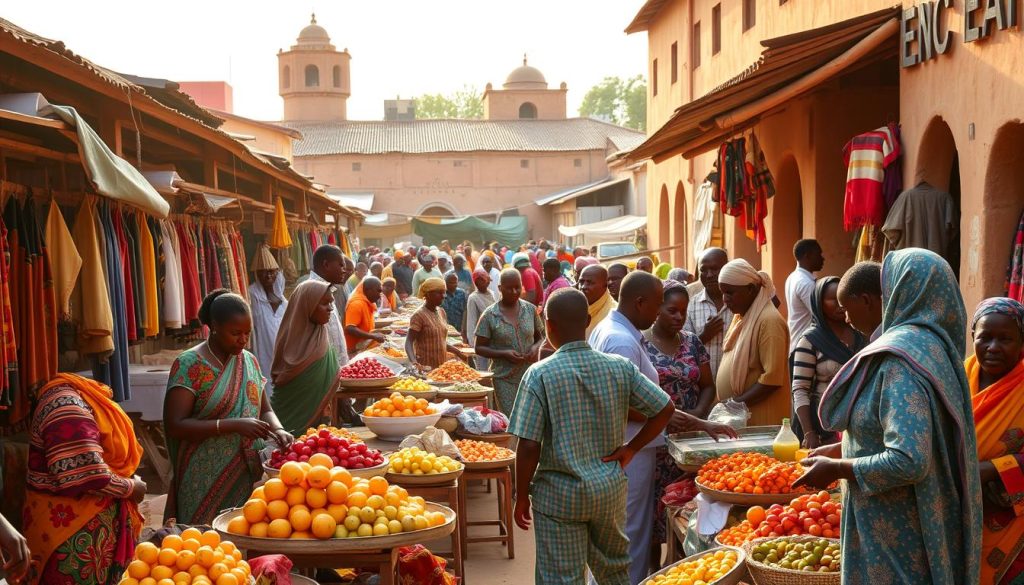
Trade is key to Africa’s economy. It boosts various sectors and aids in overall economic growth. This is why trade is so important for GDP in different countries.
Several sectors lead in African trade, including:
- Agriculture
- Mining
- Manufacturing
These industries serve both local and global markets. They help Africa grow economically. The African Development Bank highlights the role of small and medium enterprises (SMEs). They drive innovation and create jobs.
Strengthening trade ties is crucial. More investment from countries like the UK can help. This will unlock Africa’s trade potential, leading to sustainable growth.
Identifying Key Industries for Import and Export
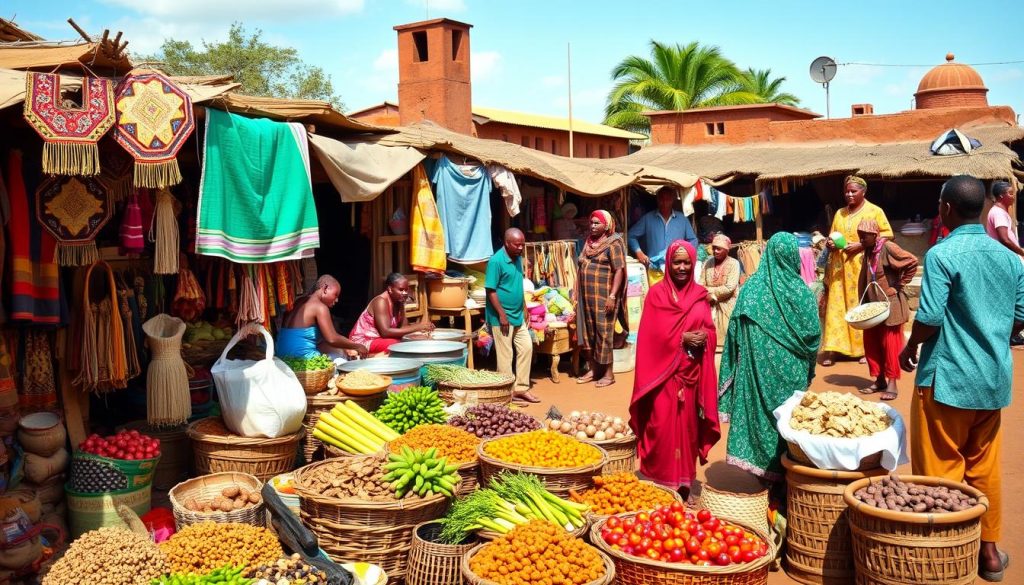
For UK businesses, knowing the key industries in Africa is key. The continent offers many sectors with great potential. These sectors are ripe for more activity in export-import industries.
- Agriculture and Food Production: Organic exports are on the rise, showing a big demand. This field covers many crops and offers chances for new farming methods to boost production.
- Mining and Minerals: Africa is full of natural resources. There are chances to invest in valuable minerals like cobalt and rare earth minerals, crucial for today’s tech.
- Renewable Energy: Africa is a leader in solar and wind power. The market for green energy solutions is strong, offering UK businesses a chance to contribute and profit.
- Technology and Telecommunications: Cities like Nairobi and Lagos are seeing a tech surge. The growing tech scene offers many opportunities for software, services, and infrastructure.
Import and Export Business Opportunities in Africa
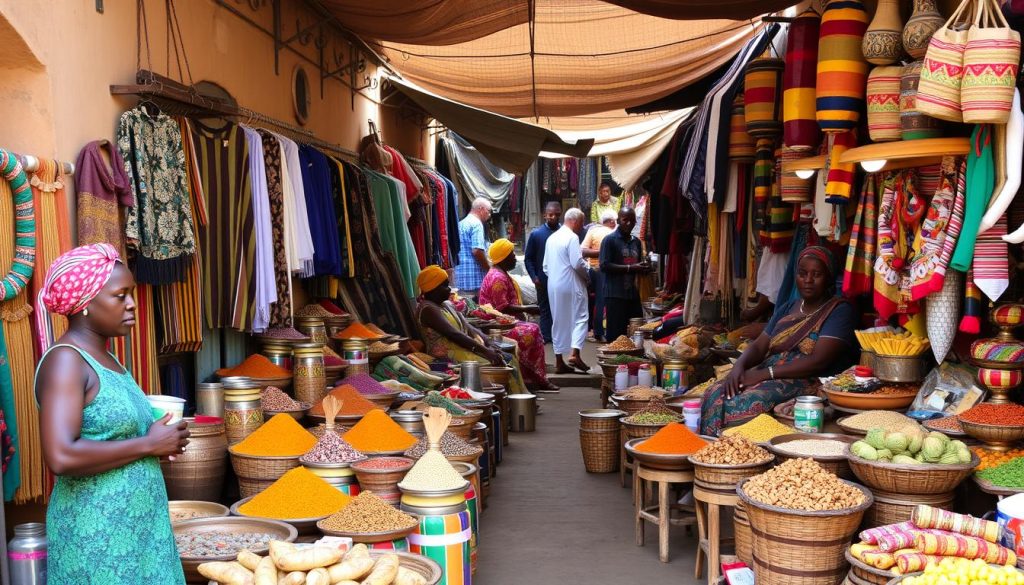
Africa offers many chances for UK businesses to import. The continent’s varied economies are growing, needing more UK goods and services. This includes healthcare, education, and tech. As Africa builds its infrastructure and workforce, the chance to export to Africa grows.
Looking at UK-Africa trade partnerships shows promising examples. For example, healthcare collaborations have improved medical services and products in Nigeria and Kenya. Educational partnerships also highlight the value of UK expertise in Africa’s education.
- Healthcare: The demand for medical equipment and pharmaceuticals is rising.
- Education: UK educational institutions are establishing partnerships with African universities.
- Technology: There is increasing interest in digital solutions for various industry sectors.
To succeed in Africa, UK businesses must understand local tastes and rules. Building strong trade ties helps enter these markets easily. This way, UK firms can use Africa’s networks and knowledge.
Doing thorough market research is key. It helps businesses meet local needs with their products and services. This mix of quality UK offerings and local demand boosts competitiveness in Africa’s growing market.
Challenges Faced by UK Businesses in Africa
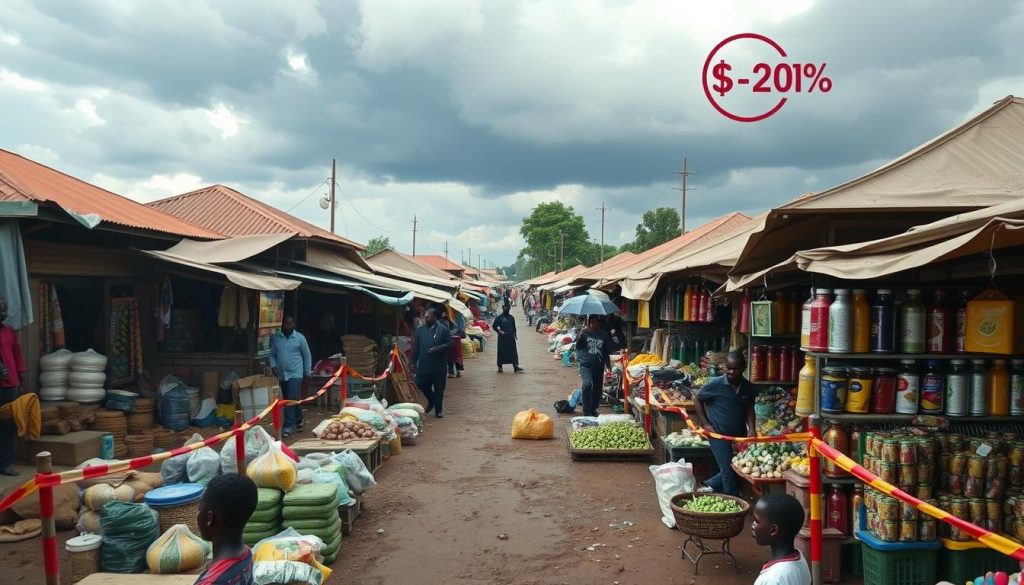
UK businesses aiming to enter the African market face many challenges. These can affect their success. Political and economic instability is a big worry in many places.
Fluctuating governance and economic policies make the business environment unpredictable. This can scare off investors and make planning hard.
Logistical and infrastructural issues add to the problems. Many African countries have poor infrastructure. This affects supply chains and distribution networks.
Poor transport links and unreliable utilities can slow down operations. This increases costs and lowers efficiency. It can also hurt the competitive edge of UK businesses in Africa.
Cultural barriers are also important. UK businesses must understand and adapt to local business norms. This is key to building good relationships and gaining market acceptance.
Trade association statistics show the scale of these challenges. Studies suggest that knowing these obstacles is crucial for UK businesses to grow in Africa. By preparing for these challenges, companies can improve their chances of success in the continent’s market.
Overcoming Regulatory Hurdles in African Trade

The regulatory environment in Africa poses challenges for UK businesses. It’s key to grasp customs rules and tariffs in major trading countries. Each African nation has its own trade rules, impacting business ease.
Many UK companies have shared their experiences with these complex rules. Their success shows the value of fitting into local rules and working with local authorities. Getting local help can make following Africa’s compliance rules easier and improve business flow.
- Do deep research on each country’s rules and tariffs.
- Build connections with local legal and compliance experts.
- Keep up with trade rule changes to stay compliant.
By tackling these regulatory challenges, UK firms can cut risks and make their operations smoother in African markets.
High-Potential African Countries for Import and Export
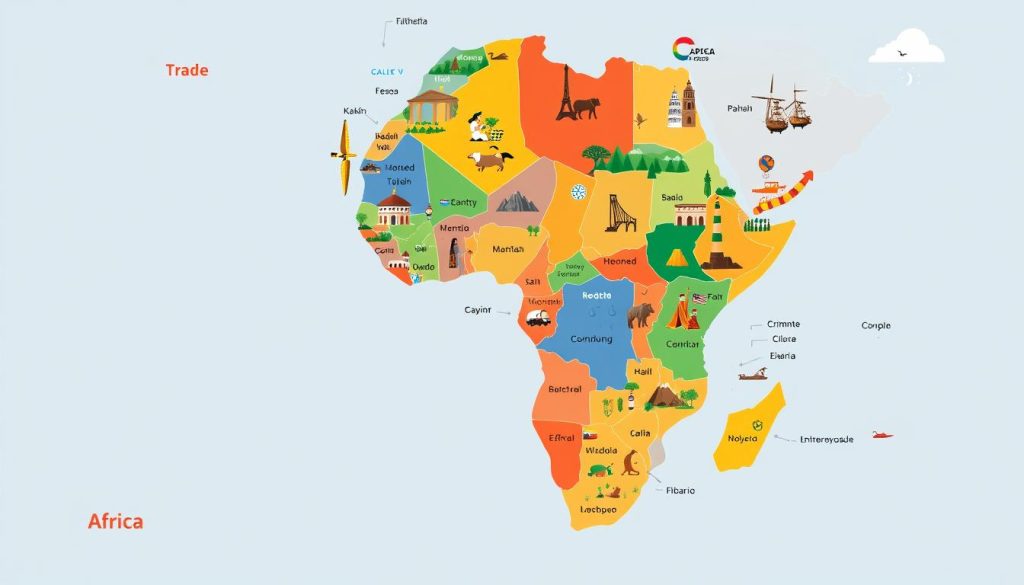
Africa is home to many countries with great potential for trade. This makes it a key area for international trade. It’s important for businesses to know these regions well.
- Nigeria: Nigeria is growing fast, thanks to a growing middle class and digital changes. Its market is getting bigger, drawing in foreign investors.
- Kenya: Kenya is known for its big agricultural exports and tech progress. It’s a hotspot for trade, especially in farming and tech.
- South Africa: South Africa has a diverse economy and strong trade connections. Its infrastructure supports many sectors, making it a good choice for entering the African market.
Trade missions show these countries are key for foreign investment. Focusing on them could lead to good results in the global trade race.
Building Relationships with Local Partners

Building strong ties with local partners is key to success in Africa. A good network of local partnerships helps businesses earn trust, understand local cultures, and follow rules well.
Finding reliable partners involves a few important steps:
- Look up local market players and their reputations through industry groups and networking events.
- Talk to current partners to see what they bring to the table.
- Use social media and professional sites to find potential partners.
Joint ventures and partnerships bring many benefits for tackling market challenges:
- Sharing resources can cut costs and expand market reach.
- Local partners offer deep insights into what customers want, making products better.
- Working together often leads to new ideas that meet specific market needs.
Many businesses have thrived by using local knowledge. Companies that focus on local partnerships often find it easier to enter the market and win over customers. Working together helps firms quickly adjust to changes, keeping them ahead in this dynamic economy.
Market Research: Tools and Techniques

Effective market research in Africa is key for businesses looking to grow. The right tools help understand market needs and how people behave. This knowledge is vital for success.
Online databases like Statista and IBISWorld are great resources. They offer detailed reports on industries. This data helps in creating solid strategies.
Working with local consultancy firms also brings deep insights. These experts know the regional markets well. They can guide on cultural aspects that affect trade.
Surveys and focus groups are crucial for understanding what customers want. Talking directly to potential buyers helps businesses improve their plans. They can adjust based on what people say and like.
By using these methods, UK businesses can improve their market research in Africa. They can make strategies that fit the local scene better.
The Role of Technology in African Trade

Technology is changing trade in Africa in big ways. Digital changes have made businesses work differently, especially with e-commerce and fintech.
Mobile tech is key for better trade and payments. With lots of people using smartphones, deals can be done faster and safer. This makes it easier for buyers and sellers to connect, helping trade grow.
Many new platforms show how tech is changing Africa’s trade:
- Jumia: This e-commerce site has made a big market for online shopping, linking local sellers with more people.
- Flutterwave: As a fintech startup, Flutterwave makes it easy to send money across borders, opening up new trade chances.
- TradeDepot: This platform makes supply chains more efficient by linking retailers straight with wholesalers.
UK businesses can use these tech advances to improve in Africa. By using new solutions, they can be more competitive and keep up with trends. Using technology in trade is key to unlocking Africa’s market potential.
Financing Options for Exporting to Africa
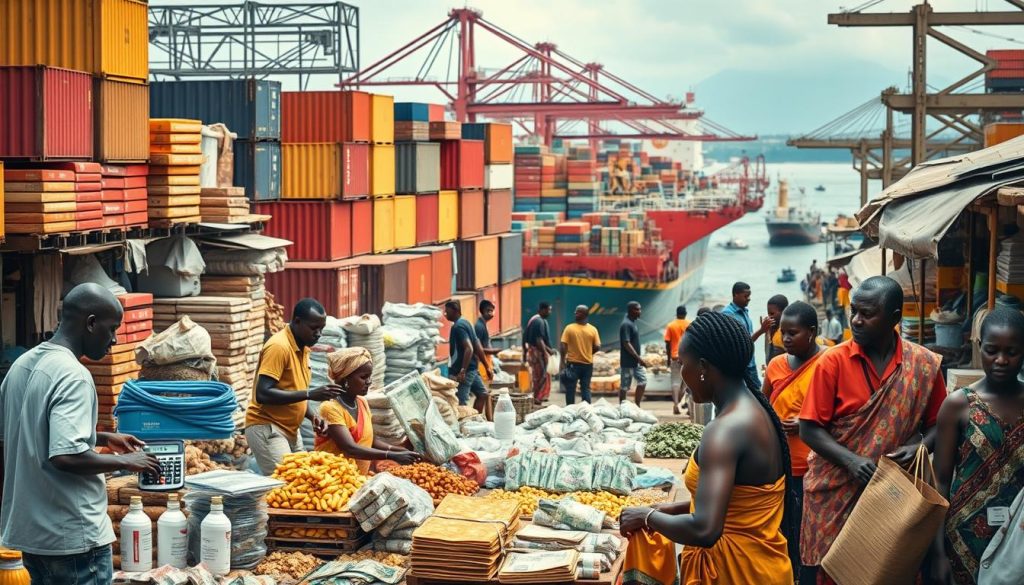
Getting the right funding is key for exporting to Africa. UK businesses need to look at different funding sources. This helps them deal with the challenges of this fast-changing market.
Government grants and interest-free loans are great for UK businesses wanting to export. These programmes focus on companies that care about the environment and society. They offer much-needed financial help.
Organisations like the World Bank and the African Development Bank are big players in financing exports to Africa. They help reduce trade risks and offer advice on local markets. This helps businesses understand where they are going.
Trade finance products, like letters of credit and export credit insurance, are also important. They help manage risks from currency changes and political issues. These tools make sure transactions go smoothly for UK businesses in Africa.
By looking into and using these funding options, businesses can do well in Africa. Knowing the financial scene helps make better choices. This improves trade between the UK and Africa.
Success Stories: UK Businesses Thriving in Africa
UK businesses have found great success in Africa, showing how opportunity and resilience can lead to growth. Companies like Diageo have grown by adapting their products to local tastes. This has not only helped them in the market but also boosted local economies.
Renewable energy sectors also share success stories. For example, Bluefield Solar has done well by working with local groups. This partnership has helped them understand and work with local rules, showing the power of teamwork in a changing market.
These stories teach us the value of understanding local culture and engaging with communities. They show that with the right approach, UK businesses can do well in Africa. This includes using innovative ideas, building strong partnerships, and really getting to know the local market.

